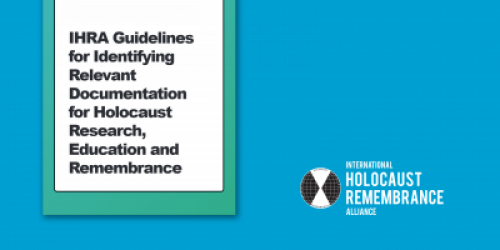Guidelines for Identifying Relevant Documentation for Holocaust Research, Education and Remembrance

Access to Holocaust-related material helps societies deal openly and accurately with the past. The European Holocaust Reseach Infrastructure overcomes the fragmentation of archival material by connecting sources, institutions and people. The EHRI Portal enables online access to information about Holocaust sources, no matter where they are located, and EHRI's extensive programme of networking and training brings people together. But finding the right source is not the only obstacle in the way of access to archives. To help archives and researchers, the International Holocaust Remembrance Alliance (IHRA) has published Guidelines for Identifying Relevant Documentation for Holocaust Research, Education and Remembrance. EHRI supports this important tool.
Erasing all traces
Open access means providing researchers and the public with the ability to find and use Holocaust-related documentation for commemoration, education and research purposes. It helps foster a world that remembers the Holocaust. The Nazis and their collaborators not only murdered Jews, Roma, political enemies and others; they did so with the intention of erasing all traces of their existence. Each and every document pertaining to life before, during and after the Holocaust is therefore extremely valuable.
Identify Holocaust-related materials
The IHRA’s Guidelines address a critical obstacle to access: the lack of a unified, openended and always evolving way to identify Holocaust-related materials. Currently, each archive and each state can adopt its own approach to determining access to this documentation. Often, a narrow, technical approach is taken when identifying these materials, like only considering documents from 1933 –1945 held in European archives as Holocaust-related. Such narrow definitions can lead to researchers being wrongfully denied access to material that might contribute to Holocaust research. Moreover, the questions researchers ask about the Holocaust and the methodologies they use to find answers are constantly changing. There is therefore a need for a flexible and open-ended tool to help define and identify Holocaust-related materials.
Privacy regulations
This practical tool was developed by IHRA experts, together with heads of individual archives – those who know their collections better than anyone else – and leaders of national and international archival system networks, including people involved in EHRI. The Guidelines offer a unified approach to identifying relevant documentation for Holocaust research, remembrance and education, thereby assisting archives and other entities in assessing their collections and allowing access to relevant documentation. Such an approach also better equips archivists to make sure that privacy regulations, like the GDPR in the EU, are applied prudently where Holocaust documentation is concerned.
Share this tool
Ensuring full and open access to Holocaust-related materials is not a niche issue – it is essential to safeguarding the record of the Holocaust. Share this tool with your network and use it as a guide to help identify which archival materials can be considered Holocaustrelated. The Guidelines and further information on encouraging open access to Holocaustrelated materials are available on the IHRA’s website.
